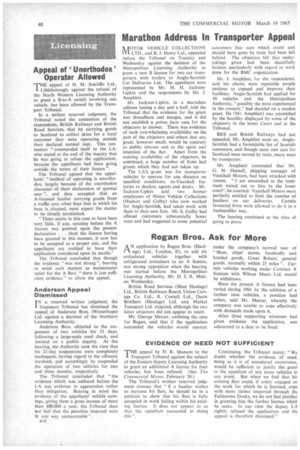Marathon Address In Transporter Appeal
Page 50

If you've noticed an error in this article please click here to report it so we can fix it.
roTOTOR VEHICLE COLLECTIONS LVI LTD., and B. J. Henry Ltd., appealed before the Tribunal on Tuesday and Wednesday against the decision of the Metropolitan Licensing Authority to grant a new B licence for two ear transporters with trailers to Anglo-Scottish Car Deliveries Ltd. The appellants were represented by Mr. M. R. JacksonLipkin and the respondents' by Mr. J. Amphlett.
Mr. Jackson-Lipkin, in a marathon address lasting a day and a half, told the Tribunal that the evidence for the grant was threadbare and meagre, and it did not establish a prima facie case for the objectors to answer. There was evidence of such overwhelming availability on the part of the objectors and others that any grant, however small, would be contrary to public interest and to the spirit and
intention of the Act. Apart from the existing availability of the objectors, he continued, a large number of firms had grants which they had not taken up.
The LA's grant was for transporter vehicles to operate for any distance on specified conditions, ex-Vauxhall factories to dealers, agents and docks. Mr. Jackson-Lipkin said two former employees of Motor Vehicle Collections (Hudson and Golby) who now worked for Anglo-Scottish, had taken work with them to their new firm. Mr. S. Golby had offered customers substantially lower rates and had suggested to some potential customers that cars which could and should have gone by train had been left behind. The objectors felt that undertakings given had been deceitfully broken, particularly with regard to work done for the BMC organization.
Mr. J. Amphlett, for the respondents, said his clients were reputable people anxious to expand and improve their facilities. Anglo-Scottish had applied for 10 vehicles and the Metropolitan Authority, " possibly the most experienced in the country," had decided on a modest grant. He (Mr. Amphlett) was astonished by the hostility displayed by some of the objectors in the lower Court and at the Tribunal.
BRS and British Railways had not appealed, Mr. Amphlett went on. AngloScottish had a formidable list of Scottish customers, and though most new cars for Scotland were moved by train, many went by transporter.
Mr. Amphlett contended that Mr. G. H. Hensall, shipping manager of Vauxhall Motors, had been attacked with venom. " I am astonished at the treatment meted out to him in the lower court", he asserted, Vauxhall Motors were perfectly entitled to limit the number of hauliers on car deliveries. Certain favoured firms were allowed to do it in a businesslike way.
The hearing continued at the time of going to press.












































































































































